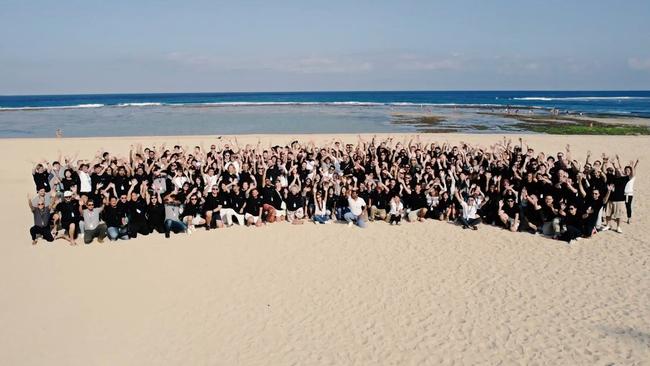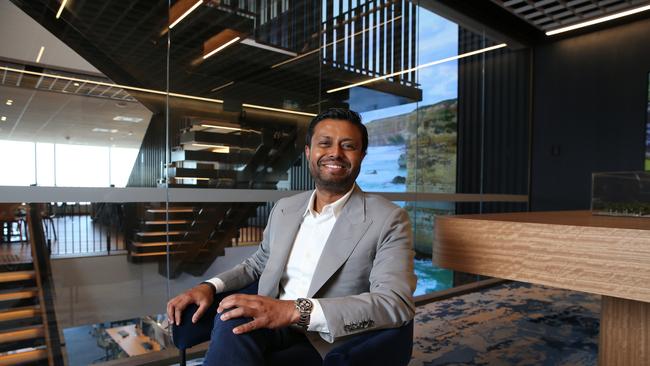AirTrunk flies most of its workforce to Bali to spur collaboration and next phase of growth
As more companies order staff back to the office, AirTrunk flew its most of its 350-person workforce to Bali for its annual strategy meeting as its founder seeks to build a $100bn business.

Robin Khuda – who has catapulted himself into Australia’s richest elite – flew most of his AirTrunk company to Bali for his data centre empire’s “annual strategy meeting”, so his 350 workers could spend time face to face.
As more Australian companies order staff back to the office, declaring an end to pandemic-era work from home arrangements, Mr Khuda booked a Balinese resort to “help propel us into our next phase of growth”.
Mr Khuda has big ambitions for AirTrunk – the data centre company he founded nine years ago and sold to US private equity behemoth Blackstone for $24bn last month – saying he can hoist it to a $100bn business.
He is continuing to lead AirTrunk under Blackstone’s ownership and hosted the company’s ‘Connect’ event in Bali under the catchcry: “think differently”. He said it was a chance to “connect, collaborate and celebrate”.
“We haven’t even scratched the surface of what’s coming up. That’s why we need to think differently, we need to continually innovate. That’s how we are going to be relevant to our customers and our stakeholders,” Mr Khuda told staff in Bali.

Atlassian work futurist and remote working advocate Dominic Price also attended the event, telling staff that: “The thing to remember is today is tomorrow’s good old days”.
Atlassian has criticised return to the office mandates – from companies including Amazon, Tabcorp, Flight Centre and the NSW government – as “wilfully endorsing the old way as a solution to new problems”.
“There are always good old days. Celebrate them and enjoy them. But your goal is to build for tomorrow. You have to find a way of embracing that,” Mr Price said.
Most companies have off site trips – but they are typically reserved for senior management or executives rather than rank and file workers – staff Mr Khuda paid tribute to after he sold AirTrunk for eight times it was worth when Macquarie bought into the business in 2020.
“Congratulations everyone. You make AirTrunk an amazing place to work for. Thank you again for all your amazing contributions,” he told staff.
AirTrunk chose Bali to host the event, saying it was a convenient location for all its staff who work across five regions in Australia, Japan, Malaysia, Singapore and Hong Kong. Activities in Bali included assembling a pushbike to help lift strategic thinking and foster collaboration.
AirTunk chief people officer Emma Spence said: “Our team culture is key to our success. By harnessing our collective talents, we will continue to push the boundaries of what’s possible, turning challenges into extraordinary results.”
Like AirTrunk, Atlassian regularly flies employees from across the globe to different locations for what it calls “intentional togetherness”, with trips lasting three to five days. This allows teams working in different countries to work together face-to-face and share ideas to spur productivity.
Atlassian head of teamwork lab Molly Sands said most teams no longer sit shoulder-to-shoulder – even if colleagues go into their closest office every day – and when teams are not co-located, “you need to be much more intentional about bringing them together”.
“We aim to have teams meet in-person at one of our offices a few times per year, and we prioritise building relationships and advancing mission-critical work during that time,” Dr Sands said.
“Team gatherings had the largest impact on team connection, with boosts averaging 27 per cent.”
This is particularly felt among younger staff. “96 per cent of new graduates agree that they feel connected to their teams in the month following a team gathering, up from 74 per cent in the month prior. And even two months after a team gathering, new graduates rate their feelings of team connection at 4.61, nearly the maximum rating of five,” Dr Sands said.
AirTrunk operates 11 data centres, which form the backbone of the artificial intelligence boom. But it’s not a mass market operator, servicing eight customers, including Microsoft, Google, Amazon and Oracle.
Those companies are looking to invest $1 trillion in cloud infrastructure within the next five years as the jostle for pole position in the AI race. Mr Khuda says this is how AirTrunk will become a $100bn business.
“All of these (data centre) customers are highly sophisticated. They are the biggest companies in the world. They will operate more data centres than anyone else. And to convince them you can do a better job than them is not easy – that’s a big barrier to entry,” he told The Australian last month.
Bain & Company says the market for data centres and other artificial intelligence-related hardware and software is set to soar 40 to 55 per cent each year – up to $US990bn ($1.45 trillion)– by 2027.
In its latest global technology report, Bain said AI will spur growth in data centres from 50 to 200 megawatts a facility to more than gigawatt. This means that if a data centre costs $US1bn to $US4bn today, it will be worth up to $US25bn five years from now.
But the surge in demand for data centres has also sparked environmental concerns, given the amount of power and water they consume.
Mr Khuda said AirTrunk had earned a reputation for being one of the more sustainable providers – which will help spur its growth further as its customers look for greener options.
He said renewable energy projects combined with battery storage could ease the environmental burden.
“We are doing a 30 megawatt project in NSW with Google. We have just done a 200MW project in Hong Kong for Microsoft. We basically bought out 50 per cent of overall renewable supply in Hong Kong. In Malaysia, we’re doing 30MW. We have a pipeline to do another in Australia, Japan – probably another two to three gigawatt over time – so there are a lot of opportunities for those renewable projects with a lot of investment.”




To join the conversation, please log in. Don't have an account? Register
Join the conversation, you are commenting as Logout